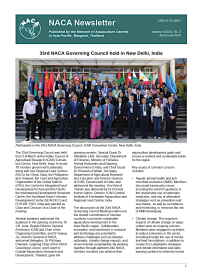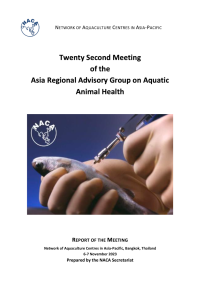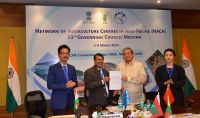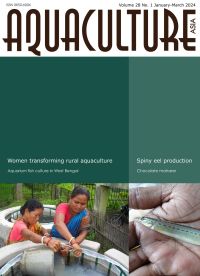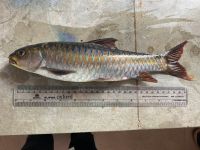This report summarises the proceedings of the 22nd meeting of the Regional Advisory Group on Aquatic Animal Health, held 6-7 November 2023. The role of the group is to review trends in disease and emerging threats in the region, identify developments in global disease issues and standards, to evaluate the Quarterly Aquatic Animal Disease Reporting Program and to provide guidance on regional strategies to improve aquatic animal health management. The meeting discussed Progress on NACA’s Asia Regional Aquatic Animal Health Programme; Farm-level aquaculture biosecurity: From a tilapia parasites perspectives; Farm level aquaculture biosecurity: Update on Operation Black Tiger Shrimp Revival; Update on WOAH Asia-Pacific Network on Aquatic Animal Health; Update on regional disease reporting and disease list.
The 33rd NACA Governing Council, currently in session in New Delhi, India, today elected Dr Eduardo Leaño as the incoming Director General of NACA. He will serve a five-year term beginning in May 2024 and succeeds Dr Huang Jie, who will complete his own five year term in April. Dr Leaño is a national of The Philippines and currently serves as the Senior Programme Officer for NACA’s Health and Biosecurity Programme, and Food Security, Safety and Certification Programme. He holds a PhD in Applied Biology from the City University of Hong Kong, a MSc in Fisheries from the University of the Philippines Visayas and a BSc in Inland Fisheries from Central Luzon State University.
In this issue:
- Neolissochilus hexagonolepis (chocolate mahseer): A flagship species for diversification of hill aquaculture in Northeast India.
- Aquarium fish culture in open village ponds in South 24 Parganas, West Bengal.
- Women nurtured transformative aquaculture in rural Bengal.
- Breeding and seed production technology of striped spiny eel Macrognathus pancalus to benefit fish farmers.
- Grow-out culture of the loach Lepidocephalichthys thermalis in modified tanks.
- NACA Newsletter.
This article investigates the ecological, economic, and cultural importance of Neolissochilus hexagonolepis, commonly known as chocolate mahseer and its potential for hill aquaculture in Northeast India. The taxonomy, distribution, and distinct features are described. Chocolate mahseer populations are in decline due to habitat degradation, overfishing and environmental changes, and it is designated as "near threatened" by the IUCN. Breeding patterns, growth parameters, and culture techniques are explored in depth as a candidate species for aquaculture development. Conservation initiatives and the need to balance economic utilisation with species conservation in chocolate mahseer farming are discussed.
